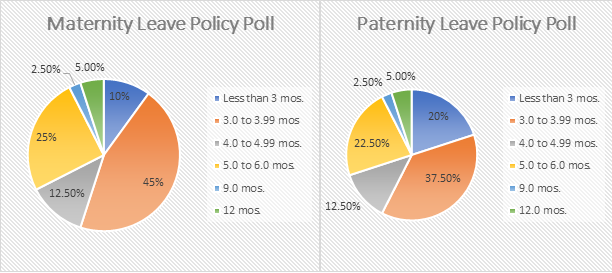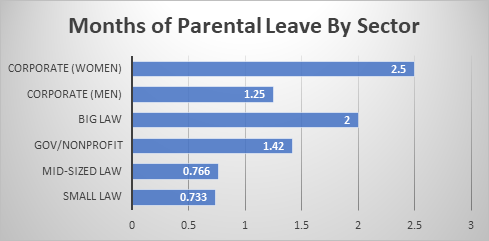To Leave Or Not To Leave: An Assessment Of Parental Leave Policy For Florida Attorneys
A Rewarding Yet Difficult Profession
Michelangelo once said, “If people knew how hard I had to work to gain my mastery, it would not seem so wonderful at all.” The practice of law—a profession filled with rewarding challenges and triumphs—is not without sacrifice. In over ten years of practice, I have assumed the fears of crime victims as a prosecutor and the despair of shareholders and executives who stand to lose it all as a commercial litigator. The burden is sometimes great, but I—like most attorneys—persevere. Whether that is due to ambition, a sense of purpose, or financial incentives will vary from person to person, but those who are truly successful seem to be motivated by something greater than themselves.[1] So let us consider, for a change, what motivates us as attorneys.
Now is the Time to Reflect on Parental Leave
Amid the COVID-19 pandemic, many attorneys stopped to reflect on what motivates them. The pandemic provided an opportunity for attorneys to be selective as demand for legal services increased.[2] Many attorneys left the profession or joined new practice areas, some moved laterally, while others transitioned to in-house or government positions. Some posit that these changes were motived by considerations of lower billable hour requirements, remote working options, alternative schedules, improved diversity, and the chance for wellness and self-care.[3] An employer’s parental leave policy is an important component of its culture and a factor that impacts all of the above.[4] As such, men and women of all ages should consider these policies as a motivator when deciding the work culture that best suits them.
State and Federal Laws Offer Very Little Parental Leave for Employees
Despite its importance, state and federal laws offer very little for employees in the area of parental leave. Florida provides no mandatory parental leave for private sector employees. While certain government employees are guaranteed a maximum of 6 months of unpaid leave, that protection applies to a select category of “career service employees.”[5] For instance, prosecutors, public defenders, law clerks, and state university professors, among many others, do not qualify for the maximum allowable 6 months of unpaid leave.[6] They, along with private sector attorneys, must rely on the minimum protections of the federal government under the Family Medical Leave Act (“FMLA”), which requires employers with greater than 50 employees to provide 12 weeks of unpaid leave.[7]
Attorneys Agree That Paid Parental Leave is Fair and Necessary
State and federal law conflicts with the general consensus among attorneys. As a part of my research, I conducted an anonymous poll of over 40 attorneys to capture their thoughts about parental leave. Participants included a diverse mix of employers/sole-practitioners and employees, and everyone agreed that a period of paid parental leave was fair and necessary for the success of families and the profession. Specifically, participants were asked what they believed was a “fair” period of parental leave for men and women. On average, employees believed approximately 4.4 months for women and 4 months for men was fair. Remarkably, employers and sole-practitioners believed that a slightly longer period of protection was fair—approximately 4.43 months for women and 4.18 months for men. A significant number of participants, roughly 30 percent, believed that families should receive 6 months or more of paid parental leave.

The Ideal: “Invest in Your Employees and They Will Invest in You”
Participants were also asked to provide a basis, if any, for why they believed employers should implement fair parental leave policies. Employees overwhelmingly noted that a fair policy reduces financial burdens for families, promotes mental health and physical recovery, and supports workers, families, and the community. One employee noted, “Invest in your employees and they will invest in you.” Several others similarly noted, “it increase[s] employee morale,” and, “employees appreciate and value employers that appreciate and value them first.” Some employees noted the impact they perceive on diversity, “[a fair policy] increases diversity of thought and experience, which is necessary to meet client needs and desires.” Employers and sole practitioners tended to agree, stating:
– Parents should not have to compromise between their work responsibilities and the health and psychological needs of the parent and baby.
– It’s the right thing to do, [it] engenders loyalty, [and] follow[s the] golden rule.
– [T]he employee you get back not only has the mental capacity to focus on work again, [but should also have] systems in place after that period to be able to support a work life balance.
The Reality: Assessing Parental Leave Policies by Sector
With these ideals in mind, I asked participants to identify the parental leave policies at their current places of employment. I organized the responses to generate the average parental leave in the following legal sectors: (1) large law firms (200+ attorneys); (2) midsized law firms (25-200 attorneys), (3) small law firms (under 25 attorneys); and (4) government and nonprofit organizations. The results of the poll suggest that the reality does not live up to the ideal. On average, the sectors provide the following paid parental leave to its employees:
– Large law firms: 2 months
– Mid-sized law firms: approximately 3 weeks
– Small law firms: approximately 3 weeks
– Government and nonprofit organizations: approximately 1.4 months
A 2020 study examining parental leave policies at 353 of the top Fortune 500 U.S. companies found that on average, women receive 2.5 months of paid parental leave, while men receive less than 5 weeks. [8]

Reconciling the Ideal with Reality
Although employers and employees tend to agree on the importance of parental leave, the policies in place do not match the ideal. This is due, in part, to the lack of state and federal laws on the subject. However, a state mandate, without a government-financed program to cover the costs, would be particularly onerous on small businesses and law firms. It is no accident that Fortune 500 corporations and big law firms on average provide the most paid parental leave—they have the resources and it provides a competitive advantage for recruiting and retaining talent. For this reason, several states, like California, New Jersey, and Washington, have implemented state-financed programs that provide access to parental leave.[9] In those states, leave is paid out of a state fund, independent of the employer and, in the case of Washington, the government compensates the employer for replacing workers out on parental leave.[10] These programs are generally financed through a tax on employees or a joint tax on employees and employers.[11] In California, for example, the tax is 0.9 percent of wages.[12]
But Florida does not have any of those programs in place and attorneys are left to fill the gap between the dream and the reality. In this regard, the results of the poll are comforting because employees and employers share a common ground—they all believe in the importance of paid parental leave. The survey further demonstrates that there is room to negotiate. In at least one instance, a participant indicated that her firm did not have a paid parental leave policy when she became pregnant, but she negotiated 3 months of paid leave based on the value she added to the firm. Twenty percent of employees at small firms indicated that their firms provide 3 months of paid leave. And at least one large law firm provided a maximum of 24 weeks of leave (18 weeks paid and 6 weeks unpaid) to the primary caretaker.
As the industry changes to accommodate a growing demand for attorneys, population shifts, and demographic changes, employees should seize the opportunity to demand greater parental leave incentives. This requires open and candid discussions about a conclusion on which everyone seems to agree—fair parental leave policies engender loyalty, increase employee morale, promote diversity, and benefit employers and employees alike.
[1] See Leonard H. Chusmir, Law and Jurisprudence Occupations: A Look at Motivational Need Patterns, 89 Com. L.J. 231, 231-35 (1984); see also James Wendell May, What Is Making Lawyers Unsatisfied and How to Fix It, Bus. L. Today, July 2016, at 1.
[2] Jessica Blaemire, ANALYSIS: Are Lawyers Jumping Ship? Or Sailing to Other Firms?, Bloomberg Law, Jul. 26, 2022, https://news.bloomberglaw.com/bloomberg-law-analysis/analysis-are-lawyers-jumping-ship-or-sailing-to-other-firms.
[3] Id.
[4] Chris Renz, Five Ways Parental Leave Can Improve Culture and Increase Diversity in Organizations, Forbes, Aug. 15, 2019, https://www.forbes.com/sites/forbeshumanresourcescouncil/2019/08/15/five-ways-parental-leave-can-improve-culture-and-increase-diversity-in-organizations/?sh=10af4d2b2920
[5] §§110.221 and 110.205, Fla. Stat. (2022).
[6] § 110.205, Fla. Stat. (2022).
[7] 29 U.S. Code §§ 2611(B)(ii) and 2612(a)(1).
[8] Courtney Connley, How Unequal Paid Parental Leave For Men and Women Can Reinforce Gender Inequality at Fortune 500 Firms, CNBC, Aug. 26, 2020, https://www.cnbc.com/2020/08/26/many-fortune-500-firms-shortchange-dads-on-paid-parental-leave-study-finds.html.
[9] Sean Price, The Problems of Parental Leave, The Center for Law and Social Policy (CLASP), https://www.clasp.org/press-room/news-clips/problems-parental-leave/ (last visited Sept. 30, 2022).
[10] Id.x
[11] Id.
[12] Id.
For more information, please contact Chemere Ellis at cellis@guerrapartners.law.

